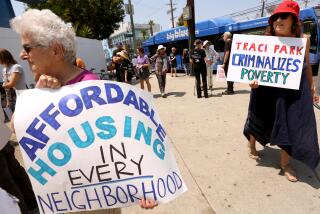Snyder: Living--and Dying--for the Cause of Homelessness
- Share via
WASHINGTON — Several years ago, I decided I could no longer report on Mitch Snyder’s activities. Life is too short and compromising to spend much energy trying to be skeptical about someone risking his death and devoting his life to people living in the street. Snyder liked to point out that, in his previous careers as a car thief, hot-check artist and Manhattan business consultant, he had been called corrupt, consumed and greedy--but never crazy. That, he insisted, only began when he turned his life over to what has become known as the cause of the homeless. A cause he lived for until his death on Thursday.
A day before the 1984 elections, he ended a 51-day fast when the Reagan Administration agreed to donate an old federal building for a shelter--the same shelter he hanged himself in. He told reporters after that fast, as he was being wheeled into a hospital emergency room, “What can I say? You all look like hamburgers to me.” One could not doubt it.
To official Washington, that part of the city that seems to live by the corner office, the power tie and the official car, Snyder presented himself with irritating calculation as a man who dressed in donated army-surplus clothes and spent nights sleeping on steam grates. He urged reporters to spend a night beside him on the street--”Don’t write about it, just do it,” he urged us, “ understand it.”
He would point out, like a man showing features of his hometown that only he knew to strangers, how a whole other city stirred into being during the small hours after midnight: Men and women slumbering in shrouds of cloth scraps on the staircase of the Lincoln Memorial; children being soothed to sleep by their mothers inside of cardboard cartons, set up like subdivisions near the State Department.
Snyder’s most unsettling tactic was to go without food, in a city where catered shrimp on the buffet table is part of the corporate diet. Years ago, we had a dull argument when I asked if his fasts weren’t imitative and coercive.
“Look,” he said, “if I ran into a house on fire to rescue someone who was trapped, would you call that coercive? A fast is a way of trying to rescue someone who could die if no one cares enough to risk his life.”
In recent years, when I would spend a few hours trying to help cook and serve holiday dinners in the downtown shelter, you practically had to make a reservation to scrub a pan. Tourists, concerned suburbanites, students and confirmed volunteers would crowd the kitchen, desperate to cut carrots. Rather like a Hollywood restaurant, servers would rush back through swinging doors, saying, “Cher! I saw her! And Martin Sheen, too!”
“Sorry I didn’t call ahead,” I told him this past Christmas. He said, only half joking, “Don’t worry. You’re always welcome.”
The shelter he helped create downtown is often overcrowded in the winter, sweltering and perilous in the summer and a dangerous place to sleep in any season. People often curl the two or three things they care most in the world about under their arms at night--a radio, some shoes, a picture--and try to fall asleep while clenched like a fist. People wheeze with the sickness they have picked up from the streets. Drugs and drunkenness have been more difficult to keep out than the cold. Snyder had been increasingly worried about that, wondering if his shelter was only helping the city to slide homeless people onto a separate shelf.
This spring, he refused to admit census takers into the shelter. His opposition to what seemed a decently intentioned step to understand the depth of homelessness surprised some of his supporters, but he told them the shelter was a home. People living in Potomac River suburbs wouldn’t look up from their beds at night to see census takers counting the number of noses between their sheets. People living at the shelter deserved the same dignity.
Snyder’s sometimes aggravating activism brought homelessness into focus for millions of Americans. But during the past 10 years, it seems to have passed from being a moral scandal into a feature of American life. Last Christmas, he was enthusiastic that the prospects for peace in the world would make greater devotion to homeless people here possible. But by this spring, he had seen the promise swallowed by the threat of the federal deficit, by the political appeal of aid to Eastern Europe and by malingering indifference. Last month the Washington City Council voted to reduce the city’s obligation to provide shelter for every citizen. Snyder seemed to read it as a sign that a decade of the most dramatic stunts and risks to make us care about those who lived in our streets had still failed to create a constituency for the homeless.
In a time when much in our politics and culture was urging Americans to be rid of guilt, Mitch Snyder was asking us to listen to voices that made us twitch with discomfort for being fortunate. “Thanks for coming,” he would often say when you left the shelter. “You can go home and take a hot shower. The people still outside can’t.” He was a hard friend that way, annoying and boorish and, damn him, bless him, always much too right.
More to Read
Sign up for Essential California
The most important California stories and recommendations in your inbox every morning.
You may occasionally receive promotional content from the Los Angeles Times.






